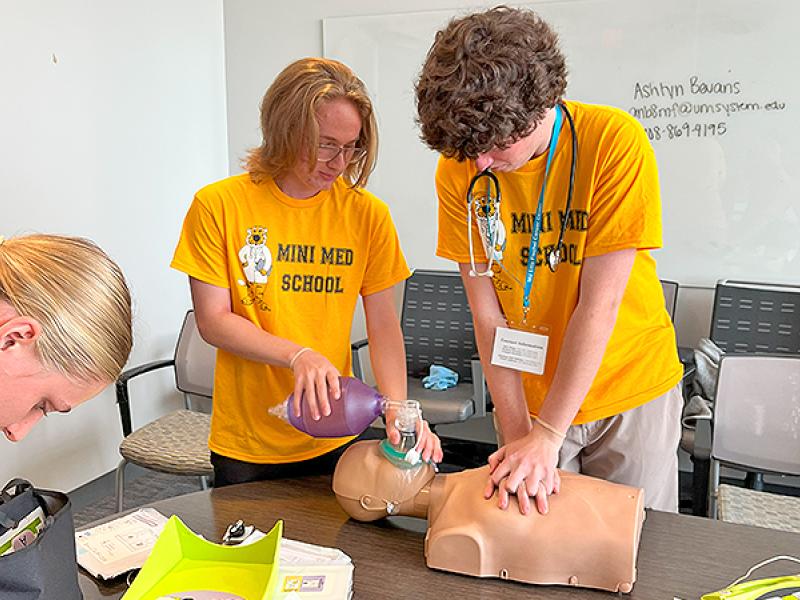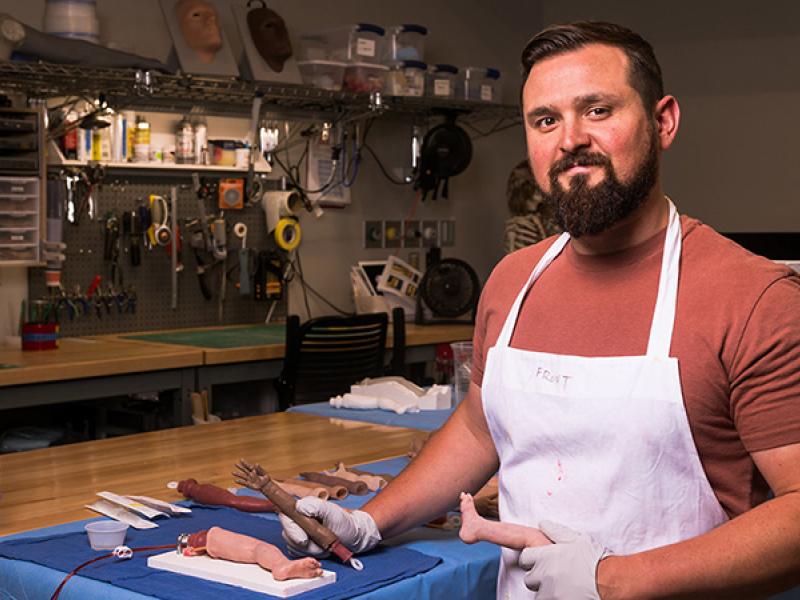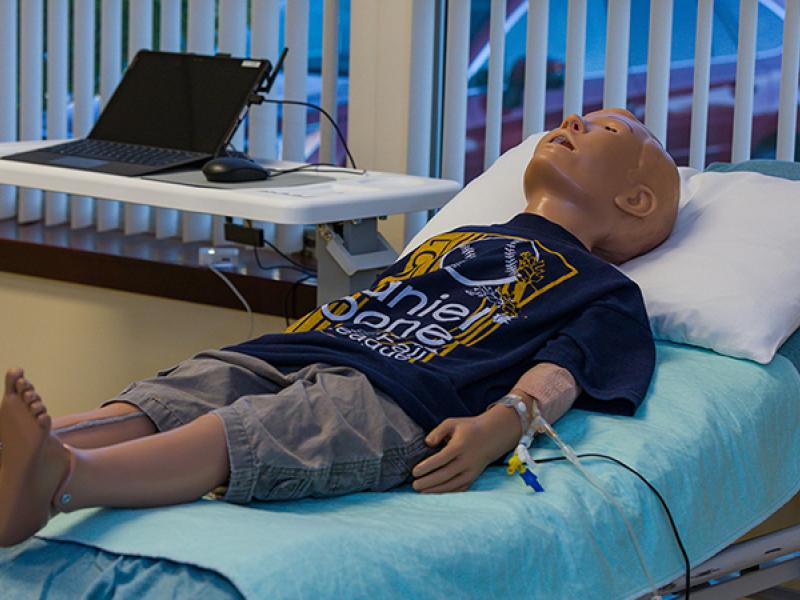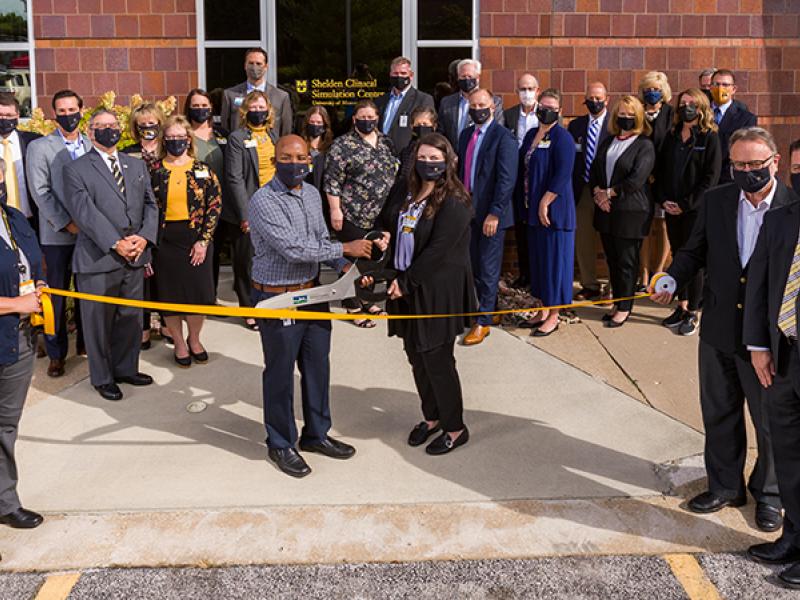The Shelden Clinical Simulation Center has a variety of services to help train students and providers.
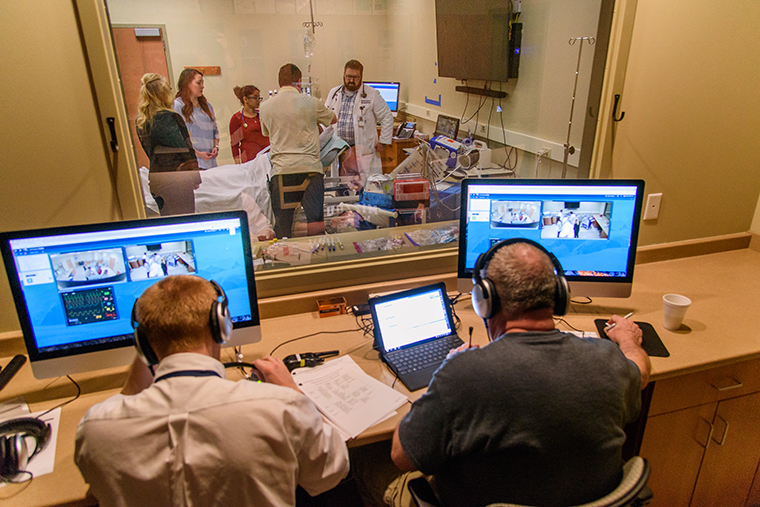
Services
Full-body Computerized Patient Simulators
The Shelden Clinical Simulation Center houses an extensive family of high-fidelity simulators, including four birthing simulators, four newborns, a 1-year old, two 5-year olds and nine adult males. These mannequins are used to teach procedures and skills as well as validate critical thinking, team performance and provide experience with high-acuity, low-volume situations that occur in the pre-hospital, hospital and other clinical environments.
Simulated Participants
A simulated participant is a person who has been carefully coached to portray an actual patient scenario so accurately that the encounter cannot be detected by a skilled health care provider. Simulated participants are used to validate a learner’s ability to interact with a patient in an appropriate, professional manner. They are very useful in teaching interview and physical exam skills as well as the evaluation of patient-centered care, cultural competency, difficult discussions and professionalism. Simulated participants provide a risk-free learning environment in preparation for interactions with real patients.
Virtual Reality
Virtual reality has been validated as a means for surgical procedures and enhancing critical-thinking skills. The center is a testing site for the Fundamentals of Laparoscopic Surgery program.
Task Trainers
Low-fidelity task trainers are fundamental tools for the instruction of clinical skills and procedures. These provide anatomically correct landmarks and allow the learner to acquire, develop and maintain motor skills required to efficiently perform a particular procedure.
Hybrid Simulations
The practice of combining any of the above simulation modalities is termed a “hybrid simulation.” The use of more than one modality allows for the creation of more realistic scenarios and uses the strength of each practice to better teach or assess learners.
Education and Assessment
The Shelden Clinical Simulation Center uses a specialized combination of hardware and software for clinical education and assessment. This facilitates the process of creating, using and reporting simulation assessments. The center offers comprehensive learning tools, including creating test cases, managing facilities, tracking users’ performance, collecting data, and generating scores and reports.
Experts at the center can provide a context for informal expert evaluation of potential clinical products, equipment and procedures being considered for use. The potential for cost savings is derived from evaluating in a low-risk, simulated clinical setting prior to broad deployment.
Along with the management of simulation event details, the web-based solution captures digital video and audio for real-time viewing to allow immediate assessment.
The center works with other simulation facilities and partners to provide innovative solutions in the growing marketplace. The simulation center personnel leverage their years of experience to lead the way in medical education, solutions and technologies.
Simulation Orientation Classes
The Shelden Clinical Simulation Center offers instruction and orientation for each of the high-fidelity simulators. We have a wide range of simulators from different manufacturers (Gaumard, Laerdal and CAE) and are able to provide classes on operation and scenario programming. These classes can prepare your simulation team for a better simulation experience with the learners. These are specialized classes that are scheduled with our outreach coordinator. For more information, call 573-884-8490.
Simulation Center Courses
The Shelden Clinical Simulation Center is an American Heart Association (AHA) Training Site, and operates as a satellite under the University of Missouri AHA Training Center. The Shelden Clinical Simulation Center offers Friends and Family CPR, Heartsaver, Basic Life Support (BLS), Advanced Cardiac Life Support (ACLS) and Pediatric Advanced Life Support (PALS), Pediatric Emergency Assessment and Recognition and Stabilization (PEARS) courses. Most courses provide two year certifications.
Many of our programs are offered via two methods:
- Classroom-based: These courses require the student to be present in class with an instructor directing the cognitive portions and skills testing. Classroom-based courses teach skills with AHA’s research-proven Practice-While-Watching (PWW) technique. This allows instructors to observe students, provide feedback and guide as needed.
- Web-based or eLearning: These courses require the student to complete cognitive skills via web-based, self-paced modules. These courses use eSimulation technology that allows students to assess and treat patients in virtual health care settings. The student practices and completes live skills testing with an AHA Instructor at a training center.
National Disaster Life Support Foundation (NDLSF) allows the Shelden Clinical Simulation Center to offer Core Disaster Life Support (CDLS), Basic Disaster Life Support (BDLS) and Advanced Disaster Life Support (ADLS) certifications.
The Missouri Department of Health and Senior Services Bureau of Emergency Medical Services has accredited the Shelden Clinical Simulation Center to offer continuing education credits to EMS providers.


